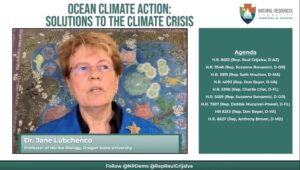From Washington, D.C to Cameroon: Climate Action in Full Effect
When looking for an internship at the beginning of the year, I knew two things that I wanted to work for an organization taking strides in climate action and gain experience working on policy at an international level. Due to the global pandemic, I was unsure if I would find an internship that met my criteria.
To my amazement, this search led me to not one but two internships. Currently, I am interning with the American Geophysical Union (AGU) and the International Center for Environmental Education & Community Development (ICENECDEV).
Advocacy with AGU

Established in 1919 by the National Research Council, AGU was originally an affiliate of the National Academies of Sciences. The work of AGU member scientists addresses processes that affect communities across the globe daily: rainfall rates, trends in fisheries, earthquake frequencies, and volcanic eruptions.
AGU and its members are dedicated to creating a sustainable future and a healthy planet through Earth and space science. To ensure this goal AGU prioritizes science policy and communication, working diligently to inform the public and policymakers of the latest findings. At the forefront of these efforts is the Public Affairs Team.
My role with AGU
As a Public Affairs intern, I have several responsibilities ranging from watching congressional hearings and writing summaries for the team, running the Public Affairs social media, writing blog posts for The Bridge (my blog post ), drafting legislative memos, and helping with the AGU fall meeting and virtual advocacy initiatives.
Science policy and communication initiatives with AGU:
- Voices for Science
- AGU Virtual Advocacy Days
- AGU Science Policy Alert

Dr. Jane Lubchenco, former NOAA Administrator (2009-2013) and University Distinguished Professor at Oregon State University speaking at the House Committee on Natural Resources hearing “Ocean Climate Action: Solutions to the Climate Crisis”.
Attending congressional hearings and AGU’s fall meeting were two opportunities that truly opened my eyes to climate policy and advocacy occurring in the US and beyond.
On November 17, 2020, the House Committee on Natural Resources held the legislative hearing entitled “Ocean Climate Action: Solutions to the Climate Crisis”. The committee was discussing several bills that have the potential to make significant strides in addressing the climate crisis. During the hearing witnesses ranging from scientists to indigenous representative were able to discuss their opinions of the bills. Witnessing scientists promote innovative initiatives and effectively communicate with congressional members was truly inspiring.

Just a few weeks later AGU’s fall meeting began. Thousands of scientists and students gathered virtually to discuss the latest in Earth and space science. It was here presented with my supervisor and co-worker on storytelling for policymakers. At this workshop, we taught attendees how to effectively communicate current science and research to advocate for policy changes.
I continued to develop my science policy skills and gained exposure to climate action on an international scale with ICENECDEV in Cameroon.
Work with me (virtually) in Cameroon

ICENECDEV is a resource-based organization that works with a team of consultants and volunteers to address key environmental issues that affect the livelihoods and communities in Cameroon and other African countries.
Throughout my time with ICENECDEV I had the privilege of working on several projects that address sustainable agriculture and renewable energy. One of the projects I was tasked with supporting through grant writing is the Cameroon Sun Bakeries Program.

The Sun Bakeries Program aims to alleviate poverty and enhance the quality of life in Cameroon by empowering women to raise their standard of living through self-sustaining micro-enterprises. These micro-enterprises are solar bakeries that utilize the ultimate renewable resource, sunshine, to cost-effectively produce a needed food staple while combating environmental degradation. I also gained firsthand experience working on the United Nations (UN) multilateral process on climate change.
ICENECDEV is partnered and accredited with multiple UN programmes including the UN Environment Programme (UNEP) and the UN Sustainable Food Systems (SFS) Programme. Through their partnership with the UN SFS, I attended the 3rd global conference of the Sustainable Food Systems Programme. Here experts from across the globe discussed achieving the Sustainable Development Goals through a sustainable food system.
In my remaining time with both organizations, I will continue my work on congressional engagement as well as assist ICENECDEV with a report on their sustainable food programs.
Reflecting
While completing two virtual internships during a global pandemic has been a challenge, the intensive first-year coursework at Bard CEP has truly prepared me for this experience. I am grateful that Bard not only allows its students to develop our skills and knowledge in the classroom but also apply what we have learned in the workforce. The internship portion of our degree places us at the forefront of policy and advocacy allowing us to make a difference and gain hands-on experience.
